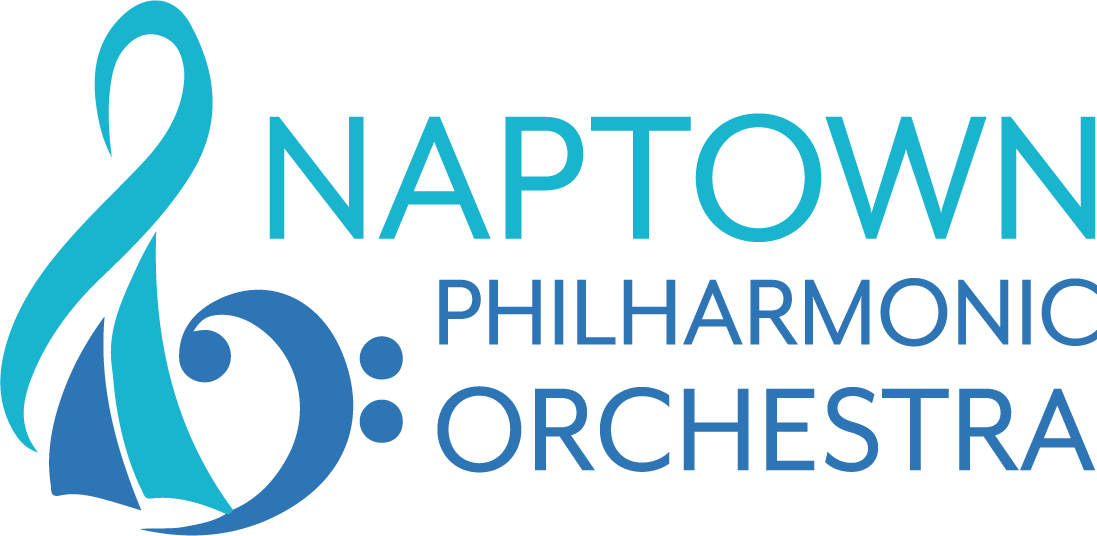Formerly The Londontowne Symphony Orchestra

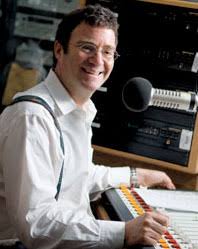
Jonathan Palevsky
Our season finale brings an orchestral experience like no other – a family-friendly sports themed concert, “Let’s Play Ball!” featuring WBJC’s Jonathan Palevsky as our narrator.
This program is inspired by the great all-American game of baseball, featuring timeless favorites such as Take Me Out to the Ball Game, Field of Dreams and Home Stretch and will captivate audience members of all ages.
And speaking of our youth, this concert also highlights the winners of our annual, state-wide Young Artist Concerto Competition (open to all high-school students throughout the state of Maryland). A heart-warming, entertaining evening for all!
What a great way to bring the 2024-2025 season to a close.
Program
John Adams (b. 1947), Short Ride in a Fast Machine
Performances by the Young Artist Concerto Competition Winners:
- Oliver Wu, Violin
Jean Sibelius (1865-1957), Violin Concerto, first movement - Luke Zegowitz, Oboe
Ralph Vaughan Williams (1872-1958), Oboe Concerto, first movement - Zack Lam, Piano
Sergei Prokofiev (1891-1953), Piano Concerto No. 2, Op. 16, G minor, last movement

Intermission

Our April concert, “An Earth Day Tribute,” was dedicated to environmental awareness through the power of music and community collaboration. From serene and vibrant melodies, our artists delivered a performance that resonated with the theme of preserving our planet.
Conducted by Anna Binneweg, this concert featured the choruses from Arundel Vocal Arts Society (AVAS) and Apex Arts Vocal Ensemble, with director Lauren Walker in Jake Runestad’s Earth Symphony, with guest conductor JoAnn Kulesza, who is director of AVAS.
The concert opened with Strauss’ timeless, picturesque waltz, the beautiful Blue Danube. We were excited to be able to highlight Polish female composer Grażyna Bacewicz in the East Coast premiere of her piano concerto performed by Bulgarian piano virtuoso Daniela Mineva.
This program delivered on its promise to be heartfelt, soul-stirring and thought provoking!
Program
- The Blue Danube Waltz, Johann Strauss II (1825-1899)
- Piano Concerto, Grażyna Bacewicz (1909-1969)
- Daniela Mineva, piano
Intermission
- An Osprey’s Song, Jefferson Holland, Poet Laureate, City of Annapolis
- Earth Symphony, Jake Runestad (b. 1986)
Guest Conductor, JoAnn Kulesza
- Seasons of Love (from RENT), Jonathan Larson (1960-1996 ) arranged by BigDougieB
About The Blue Danube Waltz
Johann Strauss II (1825-1899) was a prolific and influential composer of the 19th century. Following in the footsteps of his father, Johann Strauss I, a renowned composer and bandleader, young Johann initially resisted a musical career, seeking a profession in banking. However, the irresistible allure of music eventually won him over. Strauss quickly rose to prominence, captivating Vienna with his enchanting compositions and conducting. His career was marked by a series of iconic waltzes, polkas, and marches. Notable among his timeless creations are the The Blue Danube Waltz, Tales from the Vienna Woods, and the operetta Die Fledermaus.
Known as the “Waltz King,” he composed The Blue Danube Waltz in 1866. This masterpiece has become synonymous with the style and charm of Viennese waltz tradition, captivating audiences worldwide with its timeless beauty.
Strauss conceived The Blue Danube as a celebratory piece, capturing the spirit of 19th-century Vienna. The waltz opens with a delicate introduction that sets the stage for the enchanting melodies to come. The main theme, introduced by the strings, is a sublime and graceful melody that evokes the scenic beauty of the Danube River. Strauss skillfully incorporates various dance episodes, creating a musical journey that mirrors the lively atmosphere of a Viennese ball.
One of the most iconic moments in the waltz is the famous second waltz refrain, characterized by soaring strings and a sense of refined elegance. This section has transcended its original dance context and has become one of the most recognizable and cherished melodies in classical music.
The success of The Blue Danube lies not only in its captivating melodies but also in Strauss’s brilliant orchestration. The composer utilizes a rich palette of instruments, from lush strings to playful woodwinds and triumphant brass, creating a symphonic tapestry that captures the imagination.
—adapted from Program Note by Marcos Salgado
About Grażyna Bacewicz
Grażyna Bacewicz (1909-1969) was an outstanding figure in 20th-century music. She was a major Polish composer and a versatile musician: a child prodigy violinist, she was also a brilliant pianist. As a composer, she is known for her inventive, complex, and original musical language. Her works are receiving increasingly more attention on concert stages around the world, and she is being recognized as a trailblazer, an innovator and pioneer who traveled her creative path with conviction and resilience.
Bacewicz composed her Piano Concerto in 1949 for the Fryderyk Chopin Composition Competition organized by the Polish Composers’ Union to celebrate the 100th anniversary of Chopin’s death. The first prize was not awarded; the second went to Bacewicz. The world premiere took place on November 4, 1949, by Stanisław Szpinalski and the Warsaw Philharmonic Orchestra conducted by Andrzej Panufnik.
1949 was a prolific year for the composer—in addition to the concerto, she wrote her first piano sonata, Quartet for Four Violins, Polish Capriccio for Violin and Orchestra, Sonata for Violin and Piano No 4 (which she recorded with her brother Kiejstut), and a number of smaller works for other instruments and chamber groups.
Bacewicz was an accomplished pianist and often performed her own works for piano. Her formidable pianistic skills mean that her writing for piano is idiomatic and written with excellent knowledge of the resources of the instrument.
The opening movement, Allegro moderato, is cast as a sonata allegro with two contrasting themes, both of which are based on traditional Polish songs. The piano and orchestra engage in a dialogue of technical brilliance, wit, and humor, with a dramatic cadenza at the end of the movement. The second movement, Andante, once again makes use of a folk song (Oj chmielu, chmielu), presented in variations in successive fragments. The finale, Molto allegro, is a lively oberek, evoking a mood of primeval, rustic abandon in a perpetual movement.
—Anastasia Belina
About Daniela Mineva
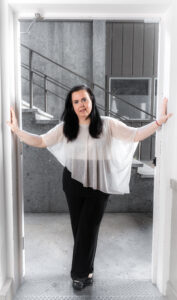
Daniela Mineva
Hailed by critics as a “vibrant and expressive performer who could steal the show in every concert” (The New York Times) and “energetic and lively pianist who displaces power and delicacy in nuanced sensitivity along with virtuoso technique” (The Baltimore Sun), Daniela Mineva’s unique approach to standard repertory, combined with the performance and dedication of works by living composers, has taken her career throughout Europe, Asia, and North and South America.
Dr. Mineva has been the winner and finalist in numerous international and national competitions, including the 2007 Jean Francaix Piano Competition in Paris, France; the 1998 Steinway International Piano Competition; and the Music and Earth International Competition in Sofia, Bulgaria, among many others. During the 2007 International Piano Meeting Festival in San Daniele, Italy, she was awarded with the “Highest Artistic Level of Performance” prize for her solo recital. At the 8th International Competition for New Music in Orléans, France, Dr. Mineva and composer Vera Ivanova were awarded the “Prix André Chevillion-Yvonne Bonnaud sous l’égide de la Foundation de France” for Ivanova’s solo piano piece “Aftertouch,” written for Daniela Mineva.
Dr. Mineva maintains an active performing career. She has appeared as orchestral soloist, chamber music collaborator, and solo artist at some of the most prestigious venues in Bulgaria, the United States, China, Italy, France, Greece, Russia, Germany, Thailand, and Costa Rica, among others.
A strong proponent of new music, Dr. Mineva has collaborated with many young and established composers and with new-music ensembles such as Speculum Musica in New York City; Earplay in San Francisco, California; and OSSIA at the Eastman School of Music and Twenty One in Rochester, New York. Dr. Mineva has also served as the president of the International Society for Pianists and Composers in the U.S. from 2011–2018. Her first CD, Volume One, presents Dr. Mineva’s passion for the music of our time and its connection to the past masters.
As an accomplished and versatile chamber musician, Dr. Mineva has participated in many music festivals and summer programs, including the Tanglewood Music Festival, Institute for Contemporary Music in New York, and the San Daniele International Piano Meeting in Italy. Dr. Mineva’s passion for chamber music led to organizing the Humboldt State University Chamber Music Concert Series at Morris Graves Museum in Eureka, California.
A devoted teacher herself, Dr. Mineva has given master classes and workshops throughout the U.S., Europe, Asia, and North and South America. Currently, she is Professor of Music and Director of Keyboard Studies at Humboldt State University in California, where in 2012 she won the “McCrone Promising Faculty Award.” Previously, Dr. Mineva has taught at the Eastman School of Music, where in 2007 she was awarded the “TA Excellence in Teaching” award, and at Concordia University in Chicago, Illinois. In 2015, Dr. Mineva and Professor Dahao Guo founded and directed the North Coast Piano Festival, where young pianists from all over the world participate in lessons, master classes, and compete at the North Coast Piano Competition for annual performances at Carnegie Hall.
Born in Bulgaria, Dr. Mineva began piano lessons at the age of five with her mother as her first teacher. She graduated from Sofia Music Academy with a Bachelor of Music degree in piano performance and the Master of Music degree in choral conducting. Dr. Mineva also holds a Master of Music degree in piano performance and an Outstanding Graduate Diploma from the University of North Texas, an Artist Certificate from Northwestern University and a Doctor of Musical Arts degree and Performer’s Certificate from the Eastman School of Music.
About Jefferson Holland, City of Annapolis Poet Laureate
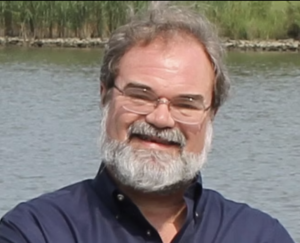 Jefferson Holland is a modern-day Chesapeake Troubadour: singer, songwriter, poet, and story-teller, performing all original material inspired by decades of life on the Bay. His outdoors column on exploring local parks appears in the Sunday Annapolis Capital Gazette.
Jefferson Holland is a modern-day Chesapeake Troubadour: singer, songwriter, poet, and story-teller, performing all original material inspired by decades of life on the Bay. His outdoors column on exploring local parks appears in the Sunday Annapolis Capital Gazette.
Mr. Holland has served as the director of the Annapolis Maritime Museum, as the Riverkeeper for the West and Rhode Rivers and Research Associate at the Smithsonian Environmental Research Center.
He co-founded the Chesapeake folk group “Crab Alley” in the 1980s and 90s, and founded “Them Eastport Oyster Boys” with partner Kevin Brooks in 1995. In 2019, Mr. Holland co-produced the Chesapeake Music Festival at the Smithsonian Environmental Research Center as part of the Smithsonian’s Year of Music. He has performed all around the Chesapeake as well as venues outside the watershed, including Ireland, Estonia and Annapolis Royal, Nova Scotia. Mr. Holland has written dozens of songs and recorded six albums.
In 1994, he was appointed the Poet Laureate of Eastport and published the children’s book, Chessie the Sea Monster that Ate Annapolis. In 2024, he was appointed Poet Laureate of the City of Annapolis. Mr. Holland lives in Annapolis with his emotional support spouse, Louise White.
About the Earth Symphony
Over hundreds of years of musical creation, composers developed the symphonic form into a potent, large-scale framework for exploring profound ideas. The sheer number of musicians involved and long duration of the work, allow the time, space, and sonic possibilities for a significant musical journey. For this commission from True Concord Voices & Orchestra, I knew that creating a large work for these forces would necessitate a significant story to tell — one of relevance and power, drawn from our beautiful and complex human experiences. Every day we hear of more fires, floods, hurricanes, droughts, tsunamis, extinctions, and diseases that impact life around the globe. The Earth is changing, due to the impact of human behavior, and how we respond to these changes will determine the survival of our species.
Through brainstorming with my frequent collaborator, poet/librettist Todd Boss, we decided that giving voice to Mother Earth would be a powerful approach for this piece. Todd created a sweeping, gorgeous, and compelling five-part monologue of a mother telling the history of her children — how they admired her, harmed her, and ultimately how she recovered.
Her story begins in a pre-life genesis that tracks the evolution of humans, whose apprehension of Earth’s laws endear them to her as nothing short of miraculous (her beloved “Mirabilia”).
Movement 1: “Evolution” hints at the musical themes of each subsequent section and establishes a sonic relationship between Earth (D Major) and humankind (E-flat Major), which is explored throughout the work.
Movement 2: “Ambition” dramatizes humanity’s fall from grace by retelling the Greek myth of Icarus and harkening to ancient instruments and melodies (including the Seikilos Epitaph — the oldest, complete musical composition yet discovered).
Movement 3: “Destruction” charges through a series of ecological cataclysms — forest fire, storms, earthquakes — illustrated by growling brass, raging percussion, and shrieking woodwinds.
Movement 4: “Lament” expresses Earth’s grief in a loving farewell to humanity that echoes Henry Purcell’s 17th-century aria, “When I Am Laid in Earth” (Dido’s Lament), and its iconic descending bass-line chaconne.
Movement 5: “Recovery” finds Earth restoring balance and moving on, into a deep spacetime like the one from which she emerged.
By anthropomorphizing Earth herself, drawing on the familiar earth-mother trope, “Earth Symphony” enables entry into our own ecological shame, guilt, responsibility, potential, and redemption, all from a wide-angled, time-telescoped lens, thereby asking our most immediately pressing environmental questions in an entirely new way.
—Program Note by composer, Jake Runestad
About JoAnn Kulesza, Guest Conductor
Music Director, Arundel Vocal Arts Society
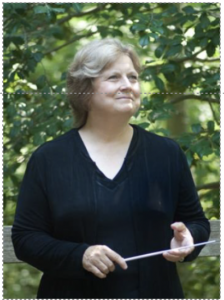 Ms. Kulesza is the recently retired Music Director of the Opera Program at the Peabody Conservatory. She began her career at the Hochschule Mozarteum in Salzburg, Austria, as coach/accompanist in opera and Lied. Professionally, she has worked as rehearsal accompanist, chorus master and assistant conductor for the Washington National Opera, Wolf Trap Opera Company, Baltimore Opera Young Artist Program, Chicago Symphony Chorus, Lyric Opera of Chicago, Compañia Lírica Nacional (Costa Rica), and the Lyric Opera Center for American Artists. She also assisted Maestro Loren Maazel for two of his Chateauville Chamber Opera Projects.
Ms. Kulesza is the recently retired Music Director of the Opera Program at the Peabody Conservatory. She began her career at the Hochschule Mozarteum in Salzburg, Austria, as coach/accompanist in opera and Lied. Professionally, she has worked as rehearsal accompanist, chorus master and assistant conductor for the Washington National Opera, Wolf Trap Opera Company, Baltimore Opera Young Artist Program, Chicago Symphony Chorus, Lyric Opera of Chicago, Compañia Lírica Nacional (Costa Rica), and the Lyric Opera Center for American Artists. She also assisted Maestro Loren Maazel for two of his Chateauville Chamber Opera Projects.
While much of her work inevitably takes place in the background, coaching singers and preparing productions for other conductors, Ms. Kulesza made her Peabody opera conducting debut in 2003. She continues in that capacity today and has many productions and several world premieres to her credit. She regularly conducts for the Lowveld Chamber Music Association in Nelspruit, South Africa. A recipient of the Johns Hopkins University Excellence in Teaching award, Ms. Kulesza has conducted master classes and guest residencies at various institutions around the country and is much in demand as a clinician and educator. As a collaborative pianist, she has played chamber music and vocal recitals throughout Europe and the United States, as well as accompanying master classes for such artists as Walter Berry, Edda Moser, Renata Scotto, and Placido Domingo.
Since 2011, Ms. Kulesza has served as Head of Opera for Music Theater Bavaria, a month-long summer opera training program in Oberaudorf, Germany. She spent six summers as Music Director of the Opera/Musical Theatre section of the two-week Fairbanks Summer Arts Festival (Alaska). Ms. Kulesza has also been Chorus Master for the Washington National Opera, Wolf Trap Opera Company, as well as assistant for the Lyric Opera Chorus (Chicago). She is currently Principal Coach/Chorus Master of Annapolis Opera.
A choral music enthusiast, Ms. Kulesza feeds her love of choral music as director at Eastport United Methodist Church in Annapolis, and as Music Director of the Arundel Vocal Arts Society (AVAS). Ms. Kulesza is retiring from AVAS this season after 18 years and this is her last public performance in that role.
About Lauren Walker, Director, Apex Arts Vocal Ensemble
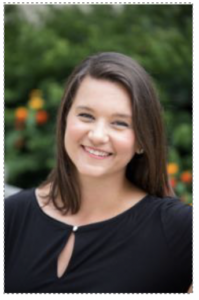 Lauren Walker earned her Bachelor of Music degree in Choral Music Education from the University of Maryland and her Master of Kodaly Music Education from Loyola University. Ms. Walker currently serves as the Lead Vocal Teacher at Broadneck High School in the Performing and Visual Arts Magnet Program in Anne Arundel County. She previously taught at Southern and Central Middle Schools and managed the Anne Arundel All County Middle School Chorus and the Maryland Junior All-State Chorus.
Lauren Walker earned her Bachelor of Music degree in Choral Music Education from the University of Maryland and her Master of Kodaly Music Education from Loyola University. Ms. Walker currently serves as the Lead Vocal Teacher at Broadneck High School in the Performing and Visual Arts Magnet Program in Anne Arundel County. She previously taught at Southern and Central Middle Schools and managed the Anne Arundel All County Middle School Chorus and the Maryland Junior All-State Chorus.
In 2020, Ms. Walker was a semi-finalist for the Anne Arundel County Teacher of the Year. Her choirs have received Superior and Excellent ratings at County and State Choral Adjudications.
Ms. Walker is a sought-after clinician and guest conductor in Maryland, Virginia, and Pennsylvania conducting Elementary, Middle, and High School honor choirs. She is an active member of the American Choral Directors Association, the National Association for Music Education, and the Maryland Music Educators Association.
She resides in Annapolis with her husband, Grant, and her children, Jackson, Caroline, and Patrick.
About Seasons of Love from Rent
In 1988, playwright Billy Aronson wanted to create “a musical inspired by Puccini’s La Bohème, in which the luscious splendor of Puccini’s world would be replaced with the coarseness and noise of modern New York.” In 1989, Aronson was introduced to Jonathan Larson (1960-1996) to collaborate on the new project. Larson came up with the title and suggested moving the setting from the Upper West Side to Lower Manhattan, where Larson and his roommates lived in a rundown apartment.
Rent premiered Off-Broadway on schedule when Larson’s parents, who were flying in for the show, gave their blessing for its performance despite Larson’s death a day earlier. The cast agreed that they would premiere the show by simply singing it through, all while sitting at three prop tables lined up on stage. But by the time the show got to its high energy “La Vie Boheme,” the cast could no longer contain themselves and did the rest of the show as it was meant to be, minus costumes. Once the show was over, there was a long applause followed by silence which was eventually broken when an audience member shouted out “Thank you, Jonathan Larson.” For his work on Rent, Larson was posthumously awarded the Pulitzer Prize for Drama as well as multiple Tony and Obie awards among others.
“Seasons of Love” starts with a piano motif, which provides the harmonic framework for the cast to sing “Five hundred twenty-five thousand, six hundred minutes” (the number of minutes in a common year). Performed by the entire cast, the lyrics ask what the proper way is to quantify the value of a year in human life, concluding in the chorus that the most effective means is to “measure in love.” Since four of the lead characters either have HIV or AIDS, the song is often associated with World AIDS Day and AIDS awareness month.
—Program Note from Wikipedia

In February the Naptown Philharmonic will take you to the Great White Way. Get ready to be swept off your feet as the NPO performs “Broadway Legends.”
This program is filled with show-stopping hits from Candide, Phantom of the Opera, Hamilton, Mamma Mia! and Tick Tick Boom! interpreted by Soprano Sarah Burrall, Tenor Brian Shatt, and Baritone Michael Pistorio.
Conducted by Anna Binneweg, the concert will also feature the talent of violist Cameron Raecke in a performance of Hummel’s Potpourri for Viola and Orchestra.
The concert will also provide an opportunity for young musicians to learn from and perform with seasoned members of the orchestra. Members of the Broadneck High School orchestra will play side-by-side with Naptown Philharmonic musicians and members of the Archbishop Spalding High School Chorus will perform some of the Broadway favorites true to our mission of providing an opportunity for professional, student, and community musicians to learn and grow under professional and experienced leadership.
“We are excited to perform some of the greatest musical showstoppers of all time, while also featuring a variety of talented students throughout the county,” said Dr. Binneweg. “It will be an afternoon of fun as we dazzle the audience…from Broadway!”
From timeless classics to modern day hits, this concert promises to highlight the breadth and depth of Broadway’s rich musical history and guarantee an afternoon of entertainment that will leave you wanting more!
Program
Leonard Bernstein (1918-1990), Overture to Candide
Johann Nepomuk Hummel (1778-1837), Potpourri for Viola and Orchestra, Op. 94
Intermission
Andrew Lloyd Webber (b. 1948), Selections from Phantom of the Opera
Jonathan Larson (1960-1996), Louder Than Words (from Tick Tick Boom!)
Lin-Manuel Miranda (b. 1980) Highlights from Hamilton
ABBA, Mamma Mia! Medley
About our soloists
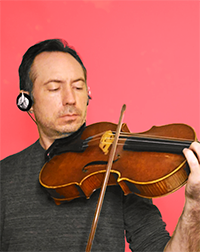
Cameron Raecke
Violist Cameron Raecke
Violist Cameron Marc Raecke, co-principal violist for the Naptown Philharmonic, is in high demand as a performer by orchestras and chamber ensembles alike. His musical travels have taken him to many places: Singapore, Canada, Mexico, even New Jersey. He is the Assistant Principal Violist of the Allentown Symphony Orchestra in Pennsylvania and member of the Mid-Atlantic Symphony, and he has performed with many other orchestras, such as the Baltimore, Fort Worth, Singapore, and Annapolis Symphonies. For his college education, Mr. Raecke attended the Peabody Conservatory in Baltimore and the University of Texas at Arlington. At the latter institution, he was a founding member of Bratsche con Brio, the resident all-viola ensemble that earned great acclaim during its tour in the Monterrey, Mexico, area and at the 27th International Viola Congress in Canada. His music festival education includes sessions at the Colorado College Summer Music Festival, the Killington Music Festival in Vermont, and the Aspen Music Festival in Colorado with a coveted three-year orchestral fellowship. More recently, Mr. Raecke is a founding member of the Movement in Music Ensemble, an innovative conductorless chamber orchestra founded in 2021 that presents memorized, choreographed musical performances.
In addition to his broad orchestral and chamber music career, Mr. Raecke has an expansive history of performing new and experimental music, having participated in many world premiere performances, from Allentown’s New Music Chamber Series — at which, in April 2022, he premiered ten new works in a single concert — to Baltimore’s High Zero Festival, the premier East Coast festival of improvised experimental music. He was an active member of his school’s New Music Ensemble when he was an undergraduate in Texas, and he has performed at Baltimore’s Red Room — a lynchpin of experimental music in the Mid-Atlantic region — and in concerts of new music at ArtScape, the largest free arts festival in the United States.
Mr. Raecke also runs a private teaching studio of both viola and violin students, some of whom have attended such presitigious institutions as the summer festival at the Brevard Music Center and Tanglewood. In its Spring 2022 issue, the Journal of the American Viola Society published Mr. Raecke’s paper, “The Three Laws of Sound Production,” in which he provides a comprehensive explanation of the basic mechanics of sound production for bowed string instruments.
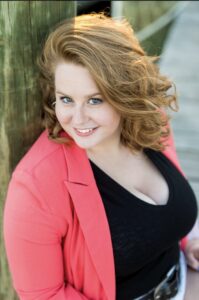
Sarah Burrall
Soprano Sarah Burrall
A Pasadena native, soprano Sarah Burrall currently teaches Choral Music and Theatre in Queen Anne’s County. A graduate of Salisbury University with a Bachelor’s in Music Education, Ms. Burrall has many performances under her belt in the Choral, Musical Theater, and Opera genres.
Ms. Burrall was most recently seen as Donna in Mama Mia! with the Chesapeake High School Theatre Company alumni production. In July of 2015, Ms. Burrall made her international debut in Assisi, Italy singing Vivaldi’s Gloria and as Mercedes in Bizet’s Carmen.
While attending Salisbury University, she performed with Musical Theater Workshop, Opera Workshop, and Theater. She also performed as Susan in Stephen Sondheim’s Company and as the Second Lady in Mozart’s Die Zauberflöte (The Magic Flute). Ms. Burrall is very excited to be singing with the Naptown Philharmonic Orchestra.
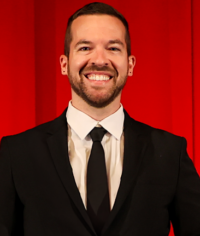
Brian Shatt
Tenor Brian Shatt
Brian Shatt is a graduate from Towson University and holds a Bachelor’s of Science Degree in Music Education and Psychology. During his time at Towson, Mr. Shatt studied voice under the direction of Grammy award winning tenor Aaron Sheehan. Mr. Shatt is the Director of Choirs at Archbishop Spalding High School in Severn, Maryland, from which he graduated in 2009. At Archbishop Spalding he conducts five choral ensembles, drama classes, and eaches AP Music Theory. Prior to Spalding, Mr. Shatt spent six years with Anne Arundel County Public Schools’ Performing and Visual Arts magnet program as its lead vocal teacher where he taught small and large ensembles and private voice lessons. Mr. Shatt has performed locally, internationally, and everywhere in between. He is excited to be a part of this performance.
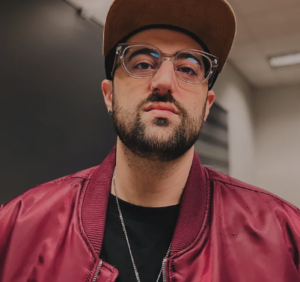
Michael Pistorio
Baritone Michael Pistorio
Baritone Michael Pistorio is a lyric baritone whose mission is to bring modern finesse to classical singing. As an artist he blends his commanding voice with intimate drama, making him an audience favorite.
Mr. Pistorio has performed as a professional chorister, concert soloist, and opera principal in the Mid-Atlantic region for over a decade. Of note was his performance of Adam in Haydn’s The Creation which The Star Democrat noted, “Pistorio knew his role well and his magnificent voice echoed with conviction and power…”
Mr. Pistorio made his international solo debuts in 2015 and 2016 as an invited artist of the Assisi Performing Arts Festival, performing the concert roles of Dancäire (Carmen), Masetto (Don Giovanni), and Marcello (La Bohéme), additionally soloing in Faure’s Requiem, Mozart’s Mass in C, and Schubert’s Mass in G. Further principal opera and concert credits include The Tender Land (Copland), The Consul (Menotti), Die Zauberflöte, Don Giovanni, Le Nozze di Figaro (Mozart), Tosca (Puccini), Der Corregidor (Wolf); Messe solennelle en l’honneur de Sainte-Cécile (Gounod), Messiah (Händel), The Creation (Haydn), Son of Man (Hall Johnson); Fantasia on Christmas Carols, Five Mystical Songs, and Songs of Travel (Vaughan Williams).
Aside from his interpretations for stage and theater, Mr. Pistorio is also a reputable sacred singer, predominantly of Christian denominations. His voice has carried in houses of worship including the Cathedral of Mary Our Queen (Baltimore), Basilica of the National Shrine of the Assumption of the Blessed Virgin Mary (Baltimore), Sacred Heart (Trenton), Washington National Cathedral (District of Columbia), and multiple houses of worship in Assisi, Italy including the Chiesa di Santa Maria Maggiore and Santa Maria sopra Minerva, the Basilica of Santa Maria degli Angeli, Cattedrale di San Rufino di Assisi, and the Basilica di San Frencesco d’Assisi both in the main sanctuary and lower chapel where St. Frances is interred.
For the 2023-24 season, Mr. Pistorio performed in the ensemble of Craig Hella Johnson’s ‘fusion-oratorio’ Considering Matthew Shepard, also covering the roles of The Fence and Soloist; was featured with Ark & Dove Presbyterian for its performance of the new sacred cantata These Ancient Words by Heather Sorenson; and joined the Heritage Signature Chorale for an inspiring performance of Beethoven’s 9th Symphony under the baton of internationally acclaimed conductor, Marin Alsop, singing a new English language text by 2017 National Poet Laureate, Tracy K. Smith.
This season, Mr. Pistorio is thrilled to make multiple role and company debuts starting with a new Christmas chamber opera by Eric Whitacre, The Gift of the Magi, a debut in the principal role as Jim Young alongside soprano Rachel Sitomer as Della Young; performing with the Naptown Philharmonic Orchestra for an evening of musical theater favorites with soprano Sarah Burrall and tenor Brian Shatt; and in a new production of Jake Heggie’s Dead Man Walking making his role debut as convicted Death Row inmate, Joseph de Rocher.

Our annual family-friendly “Halloween Spooktacular!” held just days before Halloween, is a great way to introduce kids to the beauty and fun of orchestral music.
Join us at Riva Trace Baptist Church as we combine the magic of Edvard Grieg in Peer Gynt Suite No. 1, along with haunting themes and spooky tunes you know from blockbuster classics like Batman, The Addams Family, Harry Potter and Hook.
Other holiday favorites include Thriller and Monster Mash!
Don’t forget your costume – there will be a costume contest open to all ages, prizes will be awarded! Who says orchestral music can’t be fun!

Guest Narrator Micheal Hughes
The orchestra will be conducted by Anna Binneweg with guest narrator Michael Hughes.
Program
John Williams (b. 1932), Hook: Flight to Neverland
Vic Mizzy (1916-2009), Addams Family Theme
Bobby “Boris” Pickett (1938-2007), Monster Mash
Edvard Grieg (1843-1907), Peer Gynt, Suite No. 1
Intermission
Hans Zimmer (b. 1957), Batman: The Dark Knight Rises
Costume Contest Winners Announced
Rod Temperton (1949-2016), Thriller
John Williams (b. 1932), Harry Potter and The Sorcerer’s Stone: Suite for Orchestra

In a study of contrasts, the Naptown Philharmonic’s Season Opening Concert will begin with Rimsky-Korsakov’s Capriccio Espagnol and Tchaikovsky’s Variations on a Rococo Theme, the latter featuring soloist Diana Curtis on cello. Then the audience will be treated to five pieces that celebrate the rich musical repertoire of Latin America in honor of Hispanic Heritage Month.
Featured composers are Gabriela Ortiz, Mexico; Ernesto Lecuona, Cuba; Astor Piazzolla, Argentina; Carlos Chávez, Mexico; and American Leonard Bernstein.
Music Director Anna Binneweg conducts the Naptown Philharmonic, the orchestra you know and love, in this exciting start to the 2024-2025 season, A New Chapter Begins.
Soloist Dr. Diana Curtis will perform the stunning Variations on a Rococo Theme by Pyotr Ilyich Tchaikovsky. Dr. Curtis is first chair of the Naptown Philharmonic’s cello section and has been a music educator and professional musician for over 20 years.
Program
Nicolai Rimsky-Korsakov (1844-1908), Capriccio Espagnol
Pyotr Ilyich Tchaikovsky (1840-1893), Variations on a Rococo Theme
Intermission
Gabriela Ortiz (born 1964), Mexico, Kauyumari (Blue Deer in the language of the Huichol people of Mexico)
Ernesto Lecuona (1895-1963), Cuba, Siboney
Astor Piazzolla (1921-1992), Argentina, Libertango —
with interpretation by talented tango dancers Aja Fenn and Gabriel Medeiros of Fábrica Tango
Carlos Chávez (1899-1978), Mexico, Symphony No. 2, Sinfonía India
Leonard Bernstein (1918-1990), Mambo from West Side Story
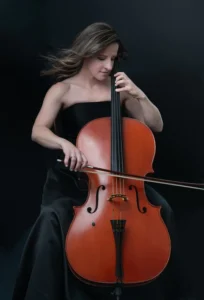
Cellist Diana Curtis
About Diana Curtis
Cellist Diana Curtis maintains an active career as a freelance musician and strings teacher. Since moving to the Baltimore/Washington D.C. area in 2003, Dr. Curtis has performed with the Annapolis Symphony, the Maryland Symphony, the Harrisburg Symphony, and the York Symphony, and is frequently a guest performer in recitals and concerts around the D.C. and Baltimore area. She is currently principal cellist of the Naptown Philharmonic Orchestra (formerly the Londontowne Symphony Orchestra) in Annapolis, Md., and has served as principal cellist with the Gettysburg Chamber Orchestra and the Shippensburg Summer Festival Orchestra. She also regularly performs with the Chesapeake Strings and Canterbury Strings chamber ensembles.
In addition to performing, Dr. Curtis is a sought-after music educator, adjudicator, and clinician. She has been a strings specialist for Anne Arundel County Public Schools for over 10 years, and currently is the Orchestra Director at Crofton High School in Anne Arundel County, Md. Dr. Curtis has served as Lecturer in Music Lessons at Messiah University and has taught string pedagogy courses at both The Catholic University of America and Messiah University. She has also served as a guest conductor for honors orchestras in Maryland and Pennsylvania.
Dr. Curtis earned her B.M. in cello performance and music education from West Virginia University, and her M.M. and D.M.A. in cello performance from The Catholic University of America. Her principal teachers were William Skidmore, Robert Newkirk, and Michael Mermagen.
When not performing or teaching, Dee likes to stay active. She is an exercise enthusiast, enjoys cooking, loves discovering new recipes, and tends to clean whenever she realizes that she is standing still. Dr. Curtis resides in Severna Park, Md, with her husband, Bill, their son, Calvin, and their two Shiba Inus.
